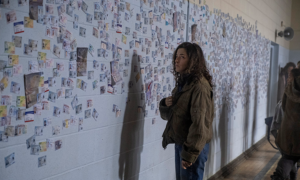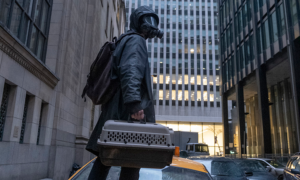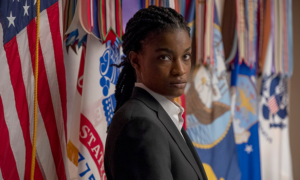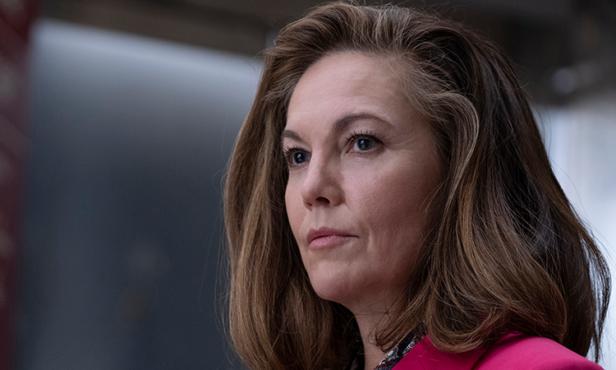Based on the 2002 DC comic book by Brian K. Vaughan and Pia Guerra, Y: The Last Man is the brand new TV series from Disney+ which sees a cataclysmic event that decimates every mammal with a Y chromosome but for Yorick, a cisgender man, and his pet monkey.
The series follows the survivors in this new post-apocalyptic world as they struggle with their efforts to restore what was lost and the opportunity to build something better.
We spoke to showrunner Eliza Clark about adapting the comic book for the small screen and star Diana Lane about playing the president in a post-apocalyptic world…
Brian K. Vaughan and Pia Guerra’s Y: The Last Man comic book ran from 2002-2008 – so there’s plenty of content from the comic book that you can call on for story ideas. Eliza, are you using it as a blueprint or as more of a jumping off point, as was the case with shows like The Walking Dead?
Eliza Clark: I read this comic book ten years ago and fell in love with it. I think it is a beautiful story about survival. It examines characters in a landscape that is constantly pressing on really interesting ideas about power and about systems of oppression. But the comic book is also 20 years old, and one of the things I was most interested in doing with this adaptation was taking all of the things I love so much about the comic book and updating it.
Our show is gender diverse, and we’ve made the representation of this world in some ways very different from the way it is in the comic book. Yorick’s maleness is not what sets him apart in this world, it’s his Y chromosome that sets him apart, so I think in that way we’ve used the book as a blueprint and I think fans of the book are really going to love it. Brian (K. Vaughan) and Pia (Guerra) were extremely excited about the ways that we could update it, and I think that’s what we’ve done with this adaptation.
Diane, with the world the way it is right now with the pandemic – why are audiences still wanting to watch shows like Y: The Last Man?
Diane Lane: There’s a lot of answers for it because there are many fans of horror that are consistent but I do think the appetite has increased. There are so many subgenres of horror. Some are gorier than others and some are more suspenseful and keep you on the edge of your seats.
I don’t really know why, but it seems to bring us a sense of community around fears that we’re coping with anyway, whether it’s being shoved out of our consciousness so that we can get through our days.
But there’s a lot looming over our heads and it’s nice to feel connected with people that are dealing with it and we have their emotional experience, instead of just watching the news and freaking out internally and acting nice all day!
And what about you Diane, did it get to you when filming it?
Diane Lane: Absolutely! Oh yeah. We were like a Russian doll of surrealism, that’s what I felt like. I mean a pandemic within a pandemic. It was a lot going on for us, and it brought us very close together like a theatre troupe or something similar which is closer-knit than would be traditional I suppose.

Eliza, there’s a very binary nature to gender identity in the comic books, and you have hinted that that’s part of what you wanted to explore with the series. How did you want to develop that?
Eliza Clark: I’m really excited to talk about this. I hope I won’t be long-winded because it’s something that I feel really passionately about!
For me what was exciting about the book was this idea. It takes this idea that a world filled with mostly women (and the book is definitely more skewed to the idea of a world of women), is not necessarily a paradise. Because women uphold systems of oppression, like patriarchy and white supremacy and capitalism. I think that there’s so much more that can be explored within that, because gender is diverse and chromosomes are not equal to gender.
So in our world, in the world of the television show, every living thing, every living mammal, with a Y chromosome dies. Tragically, that includes many women. It includes non-binary people, it includes intersex people, but that’s also true of the survivors.
That is central to my understanding of the show and I think every single person who’s working on the show, from the writers, to the directors, to the cast and the crew and researchers, are making a show that affirms that trans women are women, trans men are men, non-binary people are non-binary, and that is part of the richness of the world we get to play with.
The show is asking questions about ‘what is gender? What is identity? What makes a man? What makes a woman? What makes a human being? What are the parts of our identity that have been imposed upon us by society and what are the parts of our identities that are truly us?’.
The characters start in a very specific place, they are who they are before the world ends, and then over the course of ten episodes, and hopefully over the course of the series, they will change drastically. What’s so exciting to me is it’s a big idea, an apocalyptic universe, [but] at its core it’s a performance based character study.
I think the show is very funny, and ultimately my view of this world is optimistic. A really horrific thing happens, and a lot of people die, but there’s an opportunity to examine the systems that create identity, and then grow from them and change them. That’s what I’m excited about. I think that’s what everyone else is excited about too.
Eliza, did you want to update the series to show the changes in the amount of women in the workplace?
Eliza Clark: I think what’s really interesting is that it hasn’t changed that much. One of the things that I did right before we started the writers room was getting a bunch of research into the gender inequalities in various industries. There are obviously some industries that are doing what they can. But what I learned is that our entire economy runs on trucks. It’s called a just-in-time economy, so if you’re living in a city and to go to your grocery store, that grocery store needs two deliveries a day to be stocked for the number of people who are shopping at it, and they don’t have storage and I think 5% of truck drivers are women.
So this is definitely a world that has been decimated because cisgender men make up the vast majority of most industries, including our own. So I think in that way the world does look pretty similar to the book.
I’m a huge fan of the comic book, and I think that people who love the comic book will, I hope, love the show because the show is in the spirit of the book. In some ways, I think what had to be updated was just getting deeper into each world. So I think what’s been fun about it is just getting my hands in and really getting deeper and deeper into these characters and into the worlds they inhabit.
Diane, what made you decide to jump into TV acting for Y: The Last Man?
Diane Lane: I wanted this opportunity to work with an ensemble that was going to bring an iconic piece of writing to life. I remember speaking with various people in my life, and I was always so surprised at who was a fan of the graphic novel, so that I found intriguing, and that made me think. It made me want to lean in and take the risk on a new type of format.
I’ve only ever done one other experience of series but this one was much more of an ensemble and my part in it was certainly very interesting to me, but I’ve enjoyed the experience so much. Who knew that we were going to be faced with the experience as it laid out for all of us in the period of time that we were filming, I mean as an industry to work was challenging and we felt very lucky to have work during 2020 and 2021.

In the comic book the ‘event’ happens almost immediately, while in the show, it takes a little while. Eliza, why did you decide to go down that route?
Eliza Clark: For me, I think it’s so important to understand who these people are before the event happens. In part because so much of what the season is about is how their identities change, and how they’re starting to deconstruct their sense of self and become something new.
So I felt like even though I think that the first five pages of the book are amazing and I love that it’s so fast and in your face, I felt like for the good of a show that was so driven by character, it was nice to have an opportunity to meet them before.
Diane, you have been attached to this project for some time, how has your character President Jennifer Brown evolved over that time and what are your thoughts on the character we will see in the series?
Diane Lane: Eliza Clarke has given the world a gift in her iteration of this source material and whatever earlier versions there were, were completely blasted away, even in my memory by creating this world with this beautiful amazing cast with such devotion.
You can imagine the level of devotion that it takes to bring our performances without the normal amount of exposure to one another on a rehearsal level [due to Covid]. It took a while for us to become a pod but I don’t really reference the earlier versions and I was never really aware of the future intentions. That’s part of this type of project where you have a series – you only know a certain amount, and that’s a little scary and a little exciting for all of us!
Eliza, given the violence of the comic, were there ever any hesitations when depicting that level of violence for the TV show?
Eliza Clark: One of the things that I talked about a lot with Nina and Mary Jo and Nelly (our producers), and also with all of our directors and our DPs, was the idea of, for want of a better word, the female gaze. Yes there is violence, yes there is tragedy and yes there is death, but we were really specific about how we chose to photograph that, and how we chose to present it. So in all of our prep work and then with all of our directors, it was my intention to not make either intimacy or action gratuitous.
I think that everything has to be born from character; these are people who are trying to survive in a scary world. But the intimacy, the nudity and the violence on our show is born from character. It’s shot in a subjective way. It has a point. I think it’s something that is commenting on how many guns there are in this country. We’ve tried very specifically to make cool action sequences, but they are built from character and we have an incredible stunt coordinator, named Shelly Cook, who is the first female stunt coordinator I’ve ever worked with, and she really captured that spirit in the show.

Eliza, what were your ideas for the overall look of the show?
Eliza Clark: I wanted it to feel visceral, real and raw. Every single one of these actors [are] inncredible and they were all game to basically be completely bare-faced, roots growing in, hair all over, I mean they’re all gorgeous but they looked insane for a lot of it!
We lived through this pandemic and we’re continuing to live through it, I got my hair cut yesterday for the first time in a year and a half and we’ve all seen what happens to us physically in this kind of crisis.
Our incredible DPs Kira Kelly, Catherine Lutes and Claudine Sauvé really wanted to photograph the beauty of real skin and the kind of ways people look without all of the trappings that we put on to face a patriarchal world.
Louise Friedberg directed the first and second episodes and so much of that love comes from her. She is one of the most incredible directors. In the pilot, we meet a lot of the characters in pieces; you meet Diane’s character from behind her head, you meet Kimberly (Amber Tamblyn) via the side of her eye, Hero (Olivia Thirlby), when we see her, she’s looking at somebody scratching a rash on their neck. That is Louise Friedberg’s genius. She really thought deeply about what it would be like to shoot a television show in a way that we don’t traditionally see a television show.
Again, I’m calling it the female gaze but I think we said, ‘how are we going to photograph bodies and people in a way that celebrates the beauty of them naturally?’ but that’s not objectifying people and that is not gratuitous…
Eliza, how did you get the balance right of being faithful to the comic book but also surprising viewers?
Eliza Clark: I think that you hire a showrunner who loves the book [haha]! Brian and Pia have created these little worlds that our characters pass through and in some ways, I think what I and the writers did was just expand them, and get deeper into them, and change aspects of them to update them for the world we live in now.
But also, if you’ve read the book and you love it, I think you’ll be excited by the ways we’re kind of tricking you so you don’t know exactly what’s coming next, but I don’t think you’ll be like, ‘what is this? This is not the book that I read’. So, you have to wait and see…
Y: The Last Man will be streaming through the Star offering on Disney+ in the UK with the first three episodes on 22 September, with new episodes every Wednesday.
